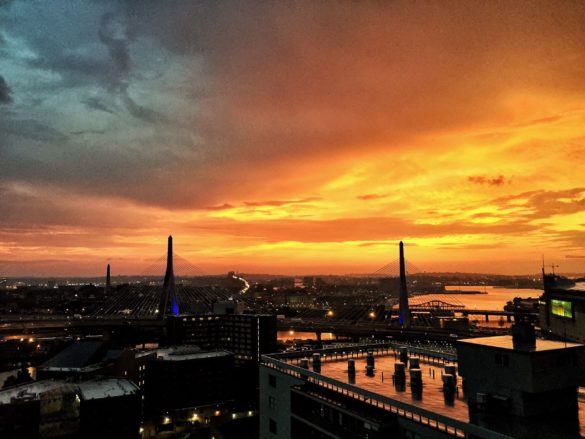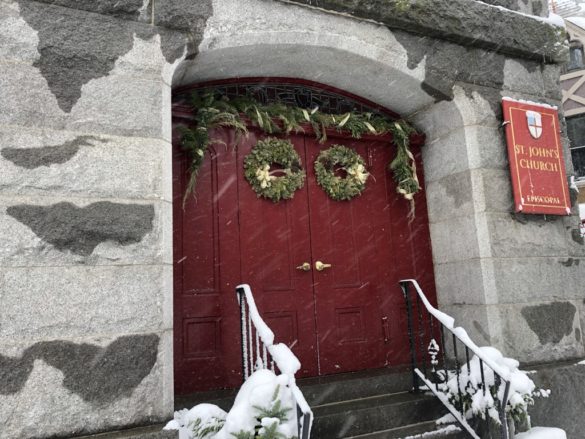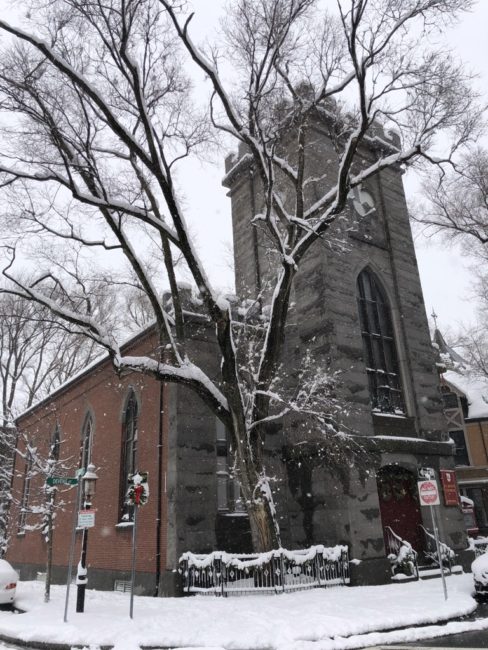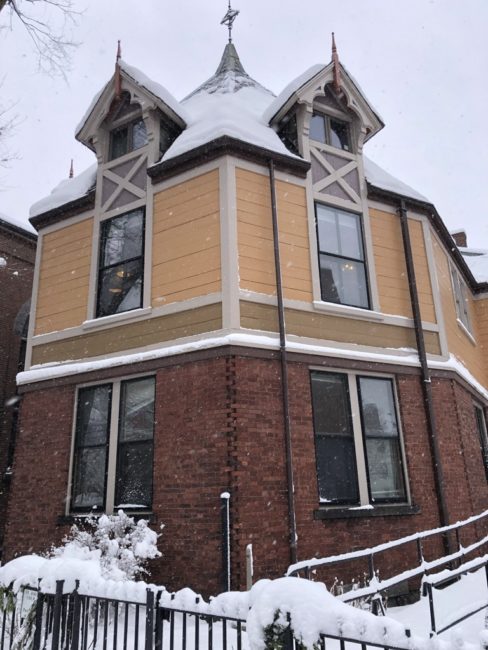Sermon — January 23, 2022
The Rev. Greg Johnston
Even in 2022, with so many free travel amenities of the past gone, 80% of hotel rooms still contain a Bible. In part, it’s because they tend to stick around. Hotels don’t have to endlessly replace tiny travel-size Bibles after guests stuff them all into their suitcases every day. And of course, they were mostly free in the first place. These hotel-room Bibles are usually donated by the Gideons, who’ve been doing exactly this for over a hundred years. You can easily picture the imagined audiences for these books: the faithful executive with no room for a Bible in her carry-on luggage; the salesman at a convention facing the temptations of the big city; the bored and unchurched traveler, who sits alone in the isolation of a modern high-rise hotel, quietly turning the pages of the Bible, and finds Jesus there for the first time.
It’s a rather different way of reading the Bible than the one I once heard from my old Syriac professor. Syriac is the classical Aramaic dialect used in the liturgy of the Maronite and Assyrian churches of Syria and Lebanon and Iraq and around the world. It’s written in its own distinctive script, a vague cousin of the Arabic and Hebrew alphabets. And when some of us were grumbling about how hard it was to learn the Syriac alphabet, George, our teacher, told us that we had it easy. George was born in Bethlehem, and he’d learned to read the Syriac alphabet when he was a child, at a monastic school in Jerusalem. He had to learn to read it in every direction—right-to-left, top-to-bottom, upside-down or backwards—because during services, he’d crowd with all the other choir boys, around a single giant, handwritten psalter to sing the psalms. You might be standing at the bottom of the page and reading rightside-up while you sang; or you might be standing at the top of the page, and reading upside-down, but either way—you certainly weren’t sitting in a hotel room alone.
There’s a strange paradox about the Bible in Episcopal churches. If you took a poll of Episcopalians asking how much of the Bible they read on their own in an average week, I’d have to think the median answer would be “none.” But walk into any Episcopal Church on any Sunday morning, and you’ll hear an uninterrupted stream of Biblical text for most of the first half of the service. The same is true of Catholic churches and many others. It’s not true in most evangelical churches, where the preacher might read a single brief “teaching text” on which he’s going to preach, or simply lace references to chapter and verse throughout the talk, for the congregation to follow along in their Bibles. This evangelical pattern has a lot of individual or small-group reading at home, little or no liturgical reading in church, and long sermons. The typical Episcopalian pattern has little or no individual reading of the Bible, lots of liturgical reading, and—one can only pray—fairly short sermons.
We’re often a bit defensive about this pattern, or dismissive about the notion of reading the Bible on your own, which is just another kind of defensiveness. Now, individual Bible reading is a wonderful thing. It can help you understand the stories of our faith more deeply and lead you to encounter God in prayer. But it’s also true that this pattern—the one we’re doing right here, right now—reading the Bible together in church, that is older and, in fact, more Biblical way of reading the Bible.
The crucial difference between reading in the modern world and reading in the ancient or medieval world is that before the invention of the printing press, every word in a every copy of a book had to be written out by hand. That’s how we ended up with the tradition of a lectionary book and a gospel book that only print the assigned readings; not for convenience or because it’s cool to walk around with a special book, but because the cost of copying out a whole Bible would’ve been prohibitive.
The expense of books and the lack of any kind of public education meant that reading was a very different thing. Books were relatively rare; readers were even rarer. But reading was common, because for most people, it meant listening to someone else read aloud. For most of human history, and most of the history of the Bible, a book was not something you looked at, but something you listened to; not pondered by yourself, but something someone else read to a room full of people, interspersed with questions and conversation. It was very much like what we do on Sunday mornings. It was very much like what Ezra and Jesus did long ago.
I can’t help but notice how familiar some of the details of these stories feel. The people gather together (Neh. 8:1; Luke 4:16) and a reader stands before them. (Neh. 8:3, Luke 4:16) One of the verses we skipped in Nehemiah says that Ezra stood in a “wooden tower,” maybe something like an old-fashioned pulpit or lectern. (Neh. 8:4) Ezra says a blessing, and the people respond give a response. (Neh. 8:6) (“Praise to you, Lord Christ.” Wait, no, that’s us.) And when the reading’s done, or as it goes along, they pause for interpretation—whether the three hours of reading and explanation as in Nehemiah, or in Jesus’ short quotation and punchy sermon: “Today this scripture has been fulfilled in your hearing.” (Neh. 8:8, Luke 4:21)
These practices of reading are communal; they’re done together, not alone. They’re liturgical; they begin and end with ritual movements and prayer. They’re architectural and postural: the reader stands, often in an elevated place, to be seen and heard more easily through a crowd. They’re often musical. While it’s not explicit in Ezra or Jesus’ case, most public speaking in the ancient world was basically chanted; not to make it fancier or because people liked to sing, but simply because, like St. John’s, they had no speaker system, and singing is a way of projecting speech.
The words they read from the Bible were not assumed to be clear and simple enough to be splashed across a billboard or a bumper sticker, or even read alone without context. They required interpretation, and often multiple interpreters. Our lectionary reading skips the verse, for reasons soon to become obvious, but Nehemiah lists thirteen Levites who assisted with the task of interpreting the law: Ezra read, but “Also Jeshua, Bani, Sherebiah, Jamin, Akkub, Shabbethai, Hodiah, Maaseiah, Kelita, Azariah, Jozabad, Hanan, [and] Pelaiah, the Levites, helped the people to understand.” (Nehemiah 8:7)
(By the way: Always take a look at the text in advance if you’re signed up to read.)
Okay, you know me. I love historical tidbits much as much as the next guy, if not much more. But this isn’t just trivia about the practice of reading. It’s actually about the substance of these readings.
When you sit alone in a quiet room and read the Bible, and hear God speaking words of comfort or inspiration or exhortation to you, it is a marvelous thing. It has the potential to create a deeper relationship between you and your God. And we should probably all do it more often.
But when we sit or stand together in a crowded (or a not-so-crowded) room, and we hear the word of God read aloud, and we say “Thanks be to God,” and we listen to some one of our number get up and offer a few words of interpretation, it too is a marvelous thing, because it calls into being, it literally creates, a community, the people of God gathered around the word of God, growing into a deeper relationship with God.
It’s no accident that these two stories happen when they do. Ezra and Nehemiah are the leaders of the first generation of Jews to be allowed to return from exile. They come back to their shattered homeland to rebuild. They’ve lived for years under someone else’s law, not their own law from God, and so when they finally return to their parents’ or grandparents’ homes, they come together to hear Ezra read from the law, and in this communal act of reading, they are made a people again.
Likewise, Luke tells us that it was Jesus’ custom to go and read in the synagogue, but he only writes one story about it, here at the very beginning of Jesus’ public ministry. He’s just been baptized in the river Jordan, and driven out to be tempted in the wilderness, and now he returns to civilization to announce what he’s about to do and to gather a movement around himself. And so he goes to the synagogue, where the people gather, and he reads.
And he reads to them, as Ezra does, from a text of liberation and solidarity. The Torah is sometimes mocked for its dietary rules and sacrificial laws, but it contains one of the earliest and most profound codes of social ethics in existence, with numerous laws to prevent the poor from going hungry and to reduce inequality, not least the “year of the Lord’s favor” that Jesus announces, the Jubilee, in which debts are forgiven, and accumulated wealth redistributed. We can scoff at the Book of Leviticus all we want, but it’s there that Jesus finds the commandment that “you shall love your neighbor as yourself.” (Lev. 19:18) And when Ezra’s finished reading from the law, the very last thing he does is to command generosity and social solidarity: “Go your way, eat…drink…and send portions…to those for whom nothing is prepared.” (Neh. 8:10) Jesus’ sermon is Nazareth is the announcement that in him, God’s reign is becoming manifest, and this is “good news to the poor…release to the captives,” freedom for the oppressed, (Luke 4:18) because solidarity and justice are the cornerstones of God’s holy law.
Standing and reading together, sitting and listening together, are not just something to do; they do something. They bind us together as a community, as a people gathered around a book like a dozen chanting choristers huddled around the psalter. And it’s not just any book. It’s a book that tells the story of a world being transformed by God into something else, of a people being knit together into a single body in which, as Paul writes, “the members of the body that seem to be weaker are indispensable,” in which “the members…have the same care for one another,” in which “if one member suffers, all suffer together with it; if one member is honored, all rejoice together with it.” (1 Cor. 12:22, 25-26)
This is the glorious work of God: God is transforming us and our world into something very different from what it is. And this is the gift of reading Scripture together: we can hear these words from two thousand years ago, these dreams of a world of justice, solidarity, and love, and say, with Jesus, every time: “Today this scripture has been fulfilled in your hearing.” (Luke 4:21)




